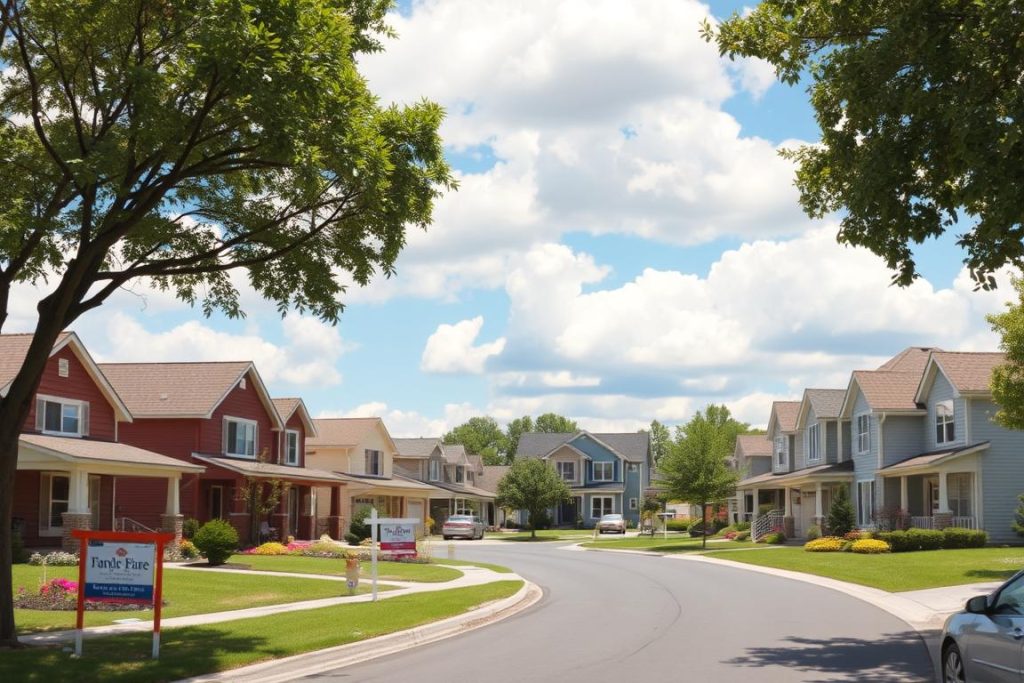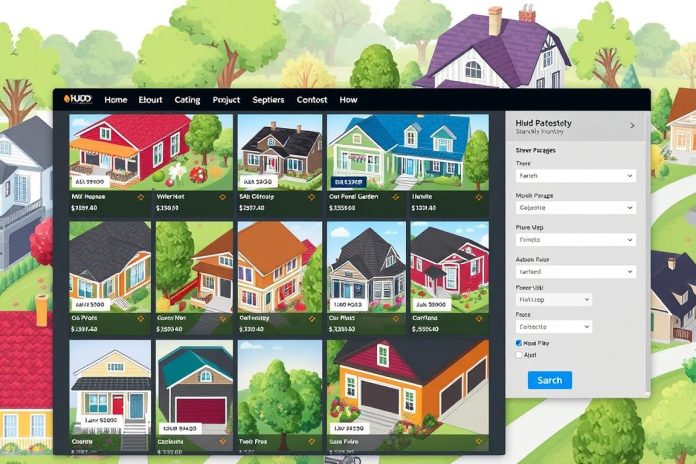Exploring the world of home buying? The HUD Home Store is a hidden gem full of government-owned home listings. It brings the American Dream closer with homes sold at market value quickly after foreclosure. Here, you can start with as little as $500 to $2,000 down1. This affordable housing hub offers big savings. You could pay low down payments with FHA loans or get half off with the Good Neighbor Next Door program if you qualify2.
Catch a HUD home for less than it’s worth with sharp eyes. This happens due to fewer buyers and special bid times for those who’ll live in the homes3. The HUD Home Store guides you from loan shopping to bidding, then on to home inspections and sorting out insurance1. Get ready to explore HUD’s options. Each step takes you closer to making a house your home.
Key Takeaways
- HUD Home Store simplifies finding government home listings at market value quickly after foreclosure1.
- Affordable earnest money and low down payments make HUD homes accessible1.
- The Good Neighbor Next Door program presents profound savings for eligible buyers2.
- First dibs on properties during exclusive listing periods benefit owner-occupant buyers3.
- FHA loans can mitigate upfront costs substantially, easing the homeownership journey1.
- A level playing field in the bidding process, as HUD evaluates bids without bias towards financing methods3.
- Prospective buyers should budget for repairs given homes are sold as-is32.
Unlocking the Secrets of the HUD Home Store
Exploring the HUD Home Store can change how you buy a home, especially with the variety of federal housing database systems. It lists many properties, like single-family homes and multifamily units. It’s a big source of government home listings.
Exploring the HUD Home Store’s Vast Inventory
The HUD Home Store is key for getting properties often cheaper than usual4. It has townhouses, apartments, and houses all over the U.S. It makes searching and buying homes easy4. This site is known for its public sector property listings. It has HUD-approved housing counselors and local Public Housing Authorities to help you4.
The HUD Difference: How Government Home Listings Stand Apart
HUD homes are great because they’re usually cheaper. They help first-time buyers and low-income families own homes easily5. The HUD Home Store mainly helps people who will live in the homes they buy, making it different from other state-owned housing listings5. If you’re a teacher or a firefighter, you might get extra discounts through the Good Neighbor Next Door program4.
Maximizing Your Search: Tips for Navigating the HUD Platform
To use the HUD Home Store well, know the best times to bid and learn about new discounts. The first 30 days are mainly for people who want to live in the homes they’re buying4. Knowing how to bid well can help you get a good deal after that period4.
The homes are sold as they are5. Think about renovation costs and how they affect your investment4. This platform offers a wide range of options, from the federal housing database to FHA loans. It’s great for long-term stability and improving communities5.
By checking out the listings and using the HUD Home Store’s programs and pricing, you’re entering a world of opportunities. This could help you find the perfect home at a great price.
Understanding the Financial Advantages of Government-Owned Homes
Looking at government-owned homes for sale reveals lots of financial perks. These perks make buying a home more affordable for various buyers. The homes in the city’s property list offer big savings and options for financial help.

Government-subsidized housing gives several choices to save on start-up costs. With options like FHA loans, down payments drop a lot6. Plus, buying HUD properties lets you find deals under market value. This means your money goes further7.
Using the city’s property database opens doors to many affordable homes. It gives you clear records and current conditions of houses. This detail is a big help, showing you deals that fit your budget and goals.
City and state databases are key for finding affordable homes, pointing to options not found easily elsewhere.
| Program | Key Benefits | Eligibility |
|---|---|---|
| FHA Loans | Low down payment options | Buyers with moderate credit scores |
| FHA 203(k) | Covers extensive repairs | Homebuyers purchasing fixer-uppers7 |
| Good Neighbor Next Door | 50% off list price for select professionals | Teachers, law enforcement, firefighters, EMTs7 |
| $100 Down Program | Minimal down payment | HUD homebuyers using FHA financing7 |
Choosing government-subsidized homes helps break down financial barriers. It also boosts community growth by making owning a home possible for more people. Buying a government home means you should think about repair costs. Even if repairs are big, you save a lot up front, getting closer to your ideal home7.
Knowing how and where to find these benefits is crucial on the path to owning a home. The city’s property database is a great tool. It helps you make smart choices. This way, you not only save money but also help create diverse, welcoming neighborhoods.
Government Home Listings: A Gateway to Affordable Homeownership
Looking into affordable homeownership begins by diving into government home listings. Platforms like NYC Housing Connect help. They offer many government-subsidized housing choices, making home ownership dreams real.
Locating Affordable Housing Options through HUD
Searching for a home gets easier with sites like the HUD website and NYC Housing Connect. They offer a detailed government housing list. You can search by area, income, and family size8. With email updates, you’ll know about new homes that fit your needs8.
Federal Housing Database: Your Source for Cost-Effective Properties
The federal housing database offers many benefits. It lists many affordable homes. It also sends alerts for deadlines and lets you submit documents online. This makes applying quicker and simpler8.
From HUD to Home: A Buyer’s Journey to Savings
Finding a home in government listings can lead to big savings. For example, NYC Housing Connect offers rentals and buying options. They use easy lotteries to help people find homes8.
The platform also lists needed documents on their site. This helps you get ready for eligibility checks8. It makes the journey to owning a home clearer, giving you the info to make smart choices.

Conclusion
The HUD Home Store is key for finding government home listings, making housing more affordable for everyone. It lists properties, like those taken back from banks by the FDIC and HUD’s own houses910. This site is a big help in your search for a cheaper home911. It offers lots of support, from big discounts for certain workers to different loan options. This gives you a better choice and a good investment911. Also, there’s less competition for these homes, so you might find a really good deal9.
When looking through the affordable homes, remember they’re sold “as-is.” This means checking the house carefully before making an offer is crucial910. Consider the impact of long-standing vacancies and liens that may come with some homes9. Still, the HUD Home Store is an excellent way to find a home at a price that helps everyone involved9.
Starting your journey to buy a HUD home means following special bidding rules. Bids from people planning to live in the home are looked at first911. If you understand these rules and the closing process, your dream home is achievable within 30 to 60 days9. So, dive into the HUD Home Store and get ready for a journey to owning a home that is both valuable and affordable.
FAQ
What is the HUD Home Store and how can it help me save when buying a home?
How do government home listings differ from regular real estate listings?
What tips can you provide for navigating the HUD Home Store effectively?
Can you explain the financial benefits of purchasing a government-owned home?
How do I find affordable housing options through the HUD?
What makes the federal housing database an excellent resource for cost-effective properties?
What should I expect during the journey from exploring HUD homes to becoming a homeowner?
Source Links
- Common Questions from First Time Homebuyers – https://www.hud.gov/topics/common_questions
- HUD Home: What Are the Pros and Cons of Buying One? | LHG – https://www.libertyhomeguard.com/hud-home-what-are-the-pros-and-cons-of-buying-one/
- What Is A HUD House? | Bankrate – https://www.bankrate.com/real-estate/what-is-a-hud-house/
- Explore the HUD Home Store: Your Key to Affordable Housing and Amazing Deals Awaiting You! – https://maxionresearch.com/explore-the-hud-home-store-your-key-to-affordable-housing-and-amazing-deals-awaiting-you/
- HUD homes: How to Buy Government Owned Properties – FasterCapital – https://fastercapital.com/content/HUD-homes–How-to-Buy-Government-Owned-Properties.html
- Real Estate Owned (REO) Definition, Advantages, and Disadvantages – https://www.investopedia.com/terms/r/realestateowned.asp
- Essential Tips for Buying a HUD Home – https://www.investopedia.com/articles/investing/091514/essential-tips-buying-hud-home.asp
- Affordable Rental and Homeownership Opportunities – https://www.nyc.gov/site/hpd/services-and-information/housing-connect-rentals.page
- What is a HUD Home? | 2024 HUD home buying guide – https://themortgagereports.com/24184/hud-homes-the-best-deal-youve-never-heard-of
- Real Estate and Property Sales – https://www.fdic.gov/asset-sales/real-estate-and-property-sales
- PDF – https://www.hud.gov/sites/documents/publicfaq.pdf

